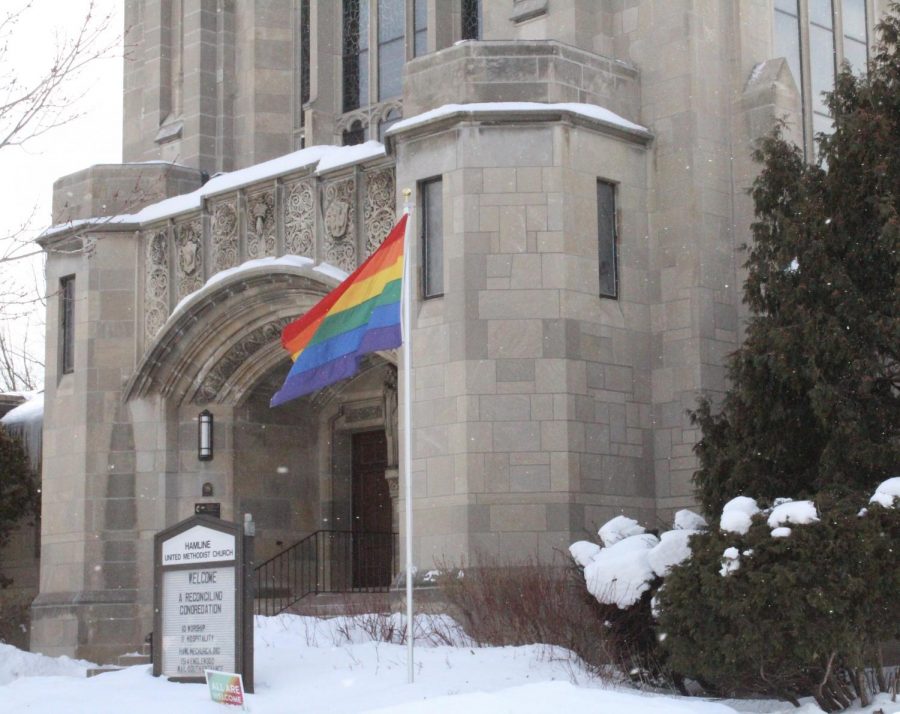The “Untied” Methodist Church
An anti-LGBTQ vote creates uncertainty for the future of the United Methodist Church — and its affiliation with Hamline.
March 13, 2019
Doubt, discord and the possibility of division are in the air for the United Methodist Church (UMC) this spring after a tense special session of the denomination’s General Conference, intended to help settle decades-long disputes on human sexuality. Out of three major proposals drafted by the UMC’s “Commission on a Way Forward,” the anti-LGBTQ Traditional Plan was the only one to win over a voting body of global delegates, prevailing 438-384 on the floor of the America’s Center Convention Complex in St. Louis, Mo.
“I just burst into tears, honestly,” University Chaplain Nancy Victorin-Vangerud said, recalling her emotions as she watched a live stream of the proceedings from Feb. 23-26. “Because I saw so clearly that this conference was going to go in a way that eventually would lead to the vote on the Traditional Plan.”
The Traditional Plan affirms statements against homosexuality in the UMC’s Book of Discipline and calls for penalties against clergy who perform same-sex weddings, with the first incident warranting a minimum year-long suspension from ministry and the second a defrocking. Methodists are still waiting for the plan’s passage to be confirmed or rejected by the UMC Judicial Council, with a decision on its constitutionality expected in late April. Prior to General Conference, several provisions of the plan were already deemed unconstitutional and left unamended before the vote.
Victorin-Vangerud supported the One Church Plan, a model endorsed by the denomination’s Council of Bishops that would remove anti-LGBTQ phrasing from the Book of Discipline and allow individual churches to make their own decisions regarding sexuality matters. The majority of U.S. delegates favored it, including senior Walker Brault.
Originally selected by Minnesota’s annual conference as an alternate, Brault had the opportunity to participate in the final vote when a seated delegate took a break. He voted against the Traditional Plan, as well as a “gracious exit” plan for dissenting churches to have an easy path out of the denomination if they desired.
“It allowed local churches to leave with their building if they paid their portion of the annual conference’s unfunded pension liabilities,” Brault said. He believed that “The way the petition was worded allowed people to essentially leave for any reason they felt, not just the specific topics that we were discussing.”
The Traditional Plan’s passage was met with shock.
“I thought either nothing would get done, or the One Church Plan would’ve passed,” Reverend Mariah Tollgaard of Hamline Church, which has been officially LGBTQ-affirming since 1999, said. “I felt every range of emotion. Grief, anger, profound sadness.”

The Hamline United Methodist Church proudly displays a Pride flag as well as an “all are welcome here” sign, despite the
decision to keep banning same-sex marriage and LGBT clergy.
A statement authored by President Miller and Victorin-Vangerud affirming Hamline’s commitment to inclusion was emailed to the student body a day after the deciding vote. Hamline’s Board of Trustees, on which Tollgaard sits, sent an echoing message.
Women’s Studies professor Kristin Mapel Bloomberg praised the immediacy of Hamline’s response, yet found its contents lacking.
“I thought it was weak. What does it mean to ‘stand’ with the LGBTQIA community?” Bloomberg said. “What does it mean to ‘firmly believe in the sacred worth of every individual?’ As I say to my students: show me, don’t just tell.”
Amidst its messages of inclusion, Miller and Victorin-Vangerud’s letter contained a quote from John Wesley: “Desire other things so far as they tend to this; love the creature, as it leads to the Creator.”
Bloomberg criticized this as well.
“The choice of the Wesley quote in the President’s message was enormously unfortunate,” Bloomberg said. “It was disappointing to see that Hamline’s leadership is completely unaware of how the use of the word ‘creature’ has been used in our culture to label and dehumanize persons who are LGBTQIA, of color, and/or indigenous. Our leaders need to do better, and choose better words.”
The President maintains that the Traditional Plan’s passage has no reflection on Hamline. Miller emphasized that Hamline is a UMC-affiliated institution, not a religious institution, as none of the property it sits on is owned by the church, nor do its finances depend on it, and that Hamline seeks to espouse historic Methodist values of social justice, inclusion, academic excellence and civic engagement, rather than religious doctrine.
While Hamline’s 155-year-old articles of incorporation state that 25 percent of trustees must be United Methodist and that all must be approved by the annual conference, she said these guidelines can be appealed and Hamline’s affiliation could be reconsidered if the global church takes a direction inconsistent with Hamline’s values. Such a discussion, though, would be far in the future.
“A lot of that depends on whether or not the vote is viewed as constitutional,” Miller said. “We reject anything that… is discriminatory in nature.”

